Humanities & Social Sciences
Makerere University Celebrates Prof. Timothy Wangusa@80
Published
4 years agoon
By
Mak@100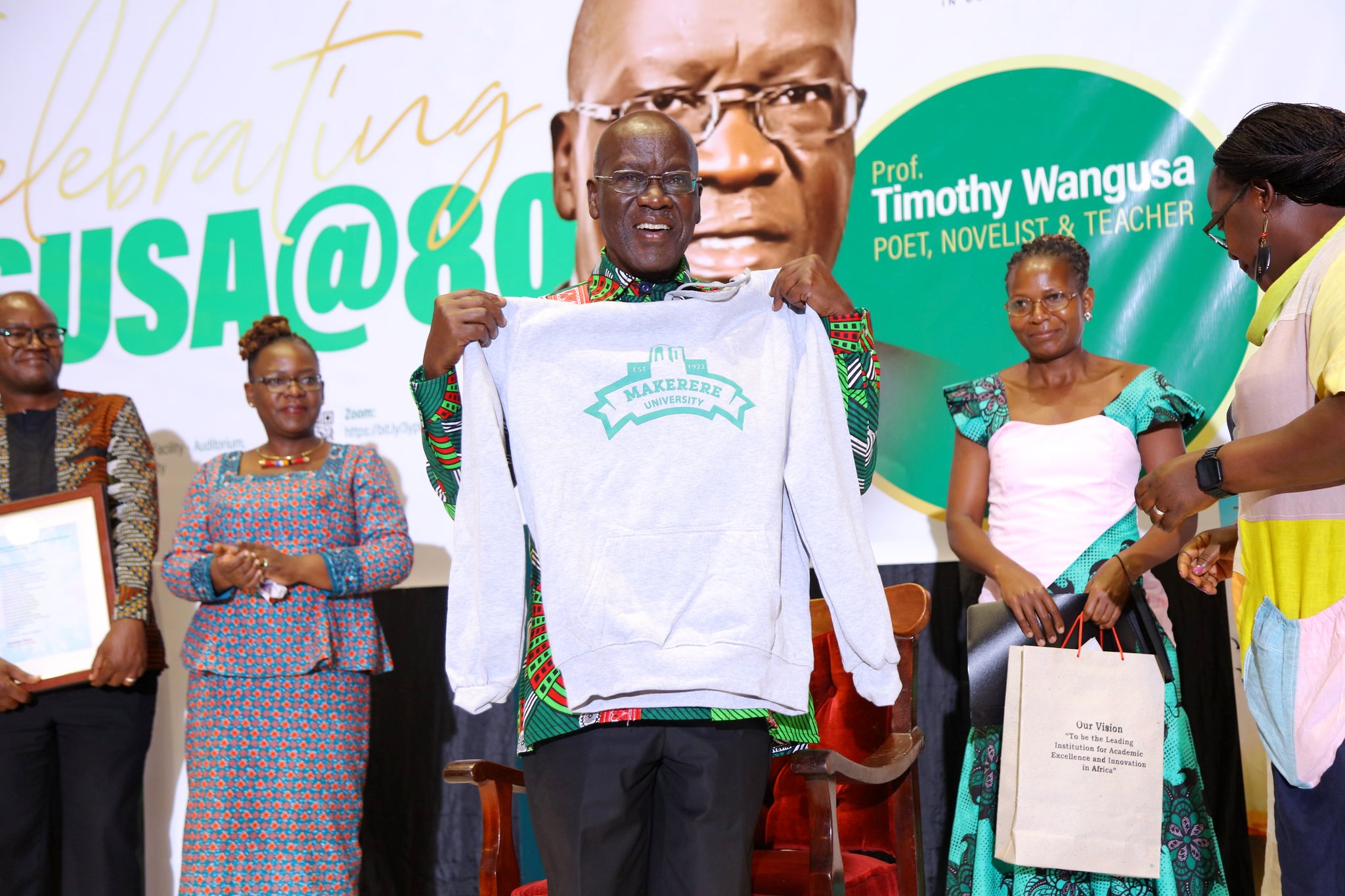
By Lazarus Okurut
It was a literati affair on Friday 8th July 2022 at Makerere University as the men and women from different spheres of life gathered to celebrate the homecoming of the eminent octogenarian poet, novelist and teacher, Professor Timothy Wangusa. The Department of Literature in the College of Humanities and Social Sciences (CHUSS) organized the event as part of the University’s rallying activities for its centenary celebrations on course this year.
In his remarks, the Acting Vice Chancellor, Professor Umar Kakumba was pleased to recognize and celebrate Professor Timothy Wangusa as “one of Makerere’s treasured literary sons” whose academic journey was “remarkable and arresting”. He described the event as an acknowledgment of the university’s “rich heritage and the people who have worked resolutely to build its indomitable strength in its century of existence.”
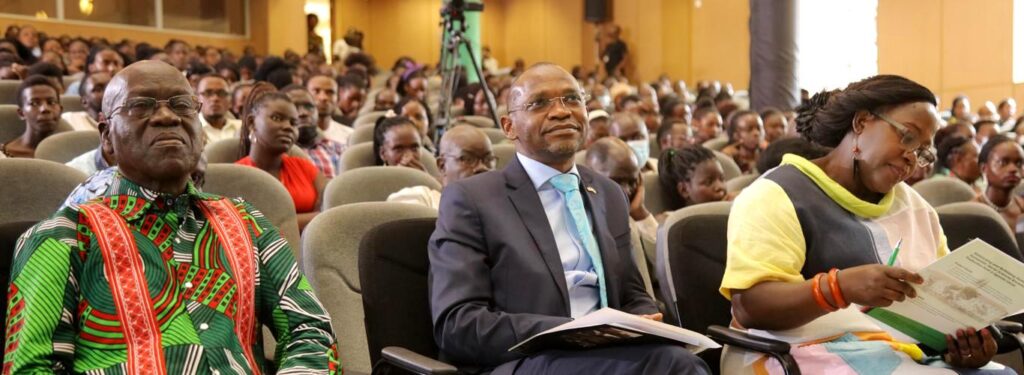
The Head of the Department of Literature was in a buoyant frame of mind and demonstrated his pride in the event by adorning a t-shirt with Wangusa’s portrait. He also declared that he was a conflicted man who did not know whether to celebrate Wangusa as a fellow Mumasaaba that had faced the knife at the foothills of Mt. Masaaba or the literary giant that made the name of the Department sound beyond Makerere’s gates.
Further setting the mood of the afternoon, the Dean of the School of Languages, Literature and Communication, Dr. Sauda Namyalo amused the audience by presenting a toy giraffe to “Baby Tim” through the “youngest” member of the Literature Department Professor Abasi Kiyimba. In a jovial mood, the Principal of the College of Humanities and Social Sciences, Professor Josephine Ahikire remarked that “Many times, we never get the chance to celebrate the life and work of our icons while they are still with us in flesh and blood. It is therefore a great honour and privilege to celebrate Professor Wangusa today, with the icon himself in our midst.”
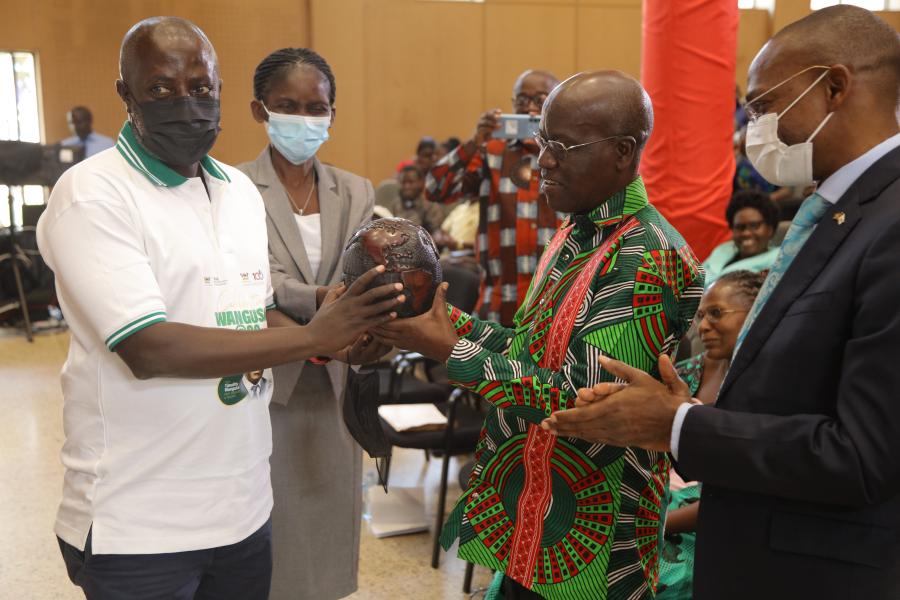
At eighty years of age, Professor Timothy Wangusa cuts the figure of a distinguished and accomplished person. Born in Bugisu, Wangusa was educated at Nabumali High School and King’s College Budo before joining Makerere University for his Bachelors’ degree. He then moved to the University of Leeds for his Masters in Literature before returning to Makerere University as a member of staff in 1969. A man of many firsts, as the Vice Chancellor described him, he pursued his doctoral studies in literature graduating in 1975 as the first Ph.D in the Department of Literature, and one of the University’s very first two since becoming independent in 1970. He was appointed Professor in 1981, just twelve years after joining the University’s faculty. At the time, the University boasted of not more than five African Professors. Having served the University in various capacities as a Teaching Assistant, Head of Department and Dean, he retired from Makerere in 2001. He has since served as the Vice Chancellor of Kumi University and played an instrumental role in the establishment of the Department of Languages and Literature at Uganda Christian University. He also previously served briefly as Minister of Education in 1985-1986 and later as a member of the Constituent Assembly in 1994-1995.
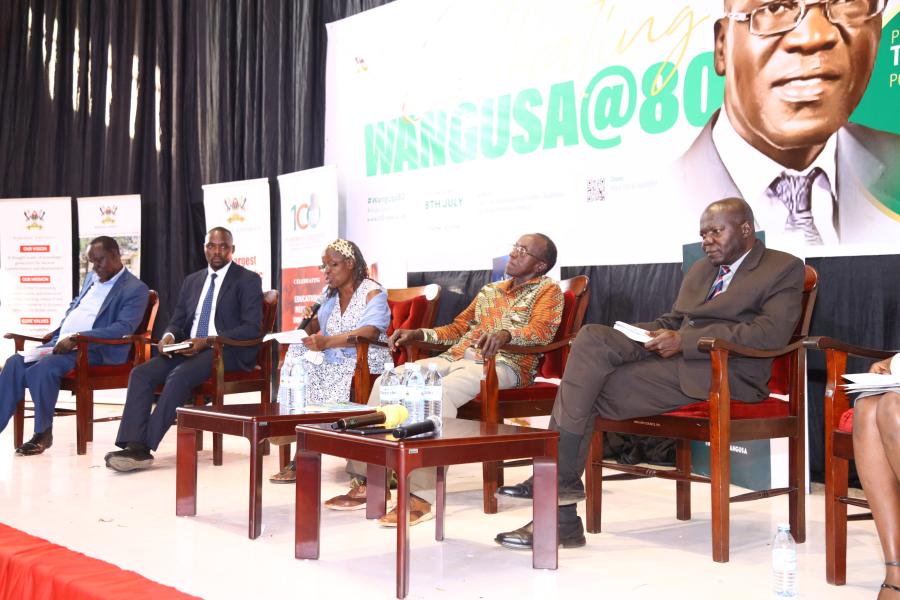
A panel comprising speakers with an excellent understanding of Professor Timothy Wangusa, his works and literature enabled the young and old in the room and online, to gain a deeper understanding of Professor Timothy Wangusa, his life as an academic, scholar, writer, social person and as a human being. The panel moderated by Dr. Susan Kiguli comprised: Professor Arthur Gakwandi, Dr. Okello Ogwang, Ms Elizabeth Kharono, Mr. James Amatre and Mr. Deusdedit Kansiime.
While Professor Abasi Kiyimba who chaired the keynote address, acknowledged that Professor Wangusa is a big name because of his writing, he argued that this was not the real reason for the enthusiasm the Department, the College and the University injected in organizing an event of the kind. Alluding to critical comments on D. H Lawrence as a “fine man of letters but a terrible human being to deal with”, the real reason for the enthusiasm, the Professor Kiyimba pointed out, was the person himself. His comments echoed those of the Chairperson of the organizing committee, Danson Kahyana, who described Professor Timothy Wangusa as “a wonderful teacher, a selfless mentor, a supportive colleague, a loving comrade and a caring friend”.
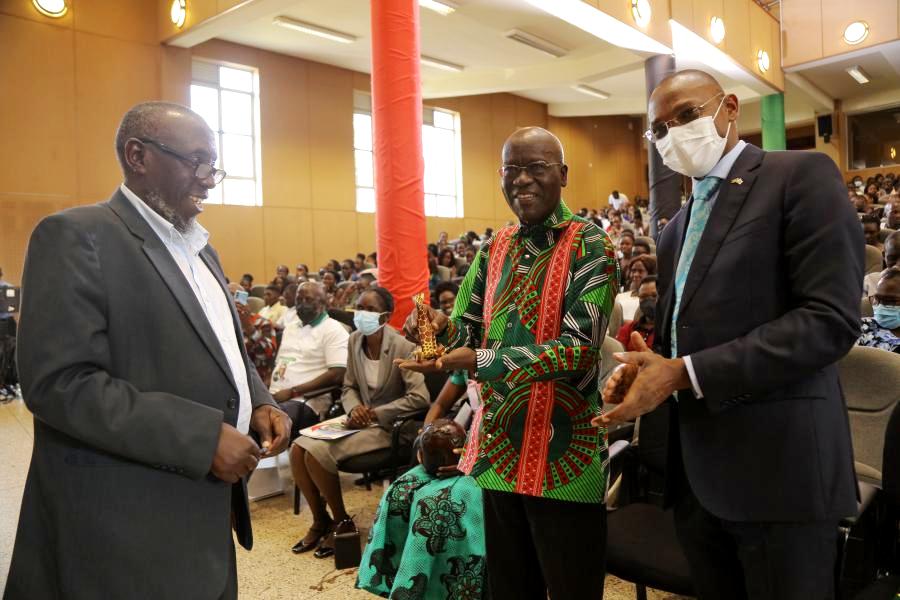
In his keynote address, the equally renowned Mwalimu Austin Bukenya, who had specifically returned from an event in Zanzibar for the event, described Timothy Wangusa as a man of the word and the world, who “has always been ready and willing to engage the wide world society of politics, public administration and many other activities.” In pointing out that the excellent communication skills that are the hall mark of all Professor Wangusa’s operations as a man of the world were acquired through linguistic and literary education, the eloquent scholar was adamant in his belief that there is no discipline that is useless. Whereas the scientific disciplines are important in skilling people in technical operations, the humanities, he pointed out, make people agents of humaneness. Indeed, his description of the humanities as human sciences speaks to the balance he envisages between scientific and artistic disciplines.
Referring to a Kenyan dramatist who likened prioritizing the one over the other to trying to walk along with one foot, he warned that the disparagement and degradation of the humanities would result in “a country of dumb, uncultured, rude and crude philistine robots, with neither desire nor ability to communicate with fellow human beings.” He challenged his audience to use the tools Professor Wangusa had armed them with to “fight for the value and validity of the humanities which sensitise, train and guide all our people in the true values of ubuntu, utu, obuntubulamu, that enable civilized human society”. This, Mwalimu Bukenya reasoned, was the best present his audience could give to a man who according to him had “pulled down the Holy Trinity from the exalted heights of heaven to the soil of our fields, with a word”.
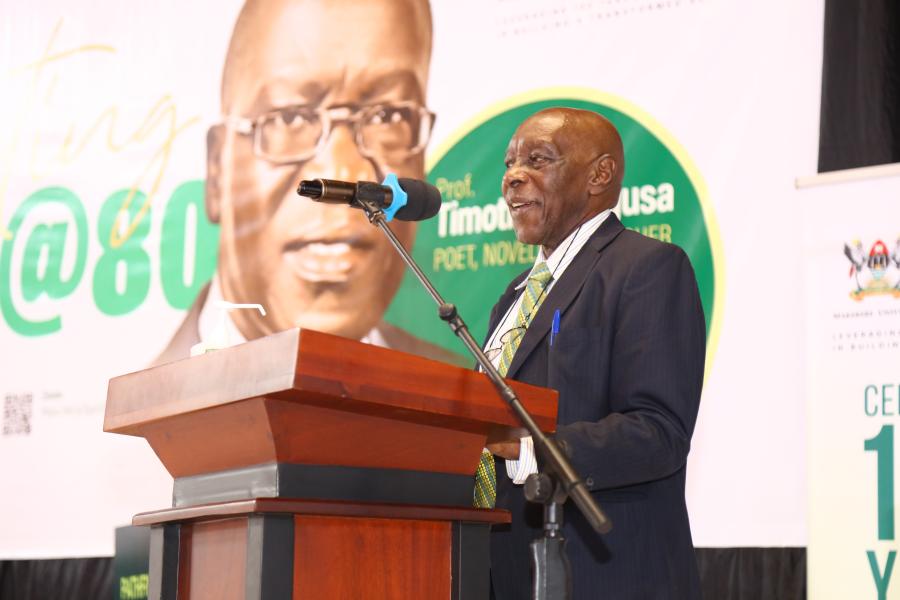
Described by one of his students, poet and teacher, Dr. Susan Kiguli, as a living example of irony being “so slight of build yet he effortlessly carries around a mountain of achievements”, Professor Timothy Wangusa was as witty as ever in thanking his audience for bestowing such honor upon him. As if picking up the thread of his colleague, Mwalimu Austin Bukenya, he located himself in arithmetic terms “equidistantly” between his alma mater, Makerere University, which celebrates a century this year and his country, Uganda, which marks 60 years of independence this year. He informed his audience that both his teaching and writing careers point to and emphasise the “mutual importance of the spoken word and the written word especially in their being used creatively”. Both careers, he said, were informed by his discovery of the significance of the economy of words.
The event featured performances of the Professor Wangusa’s poems by the Third Year Poetry Class 2021/2022. It was also marked by Professor Wangusa’s family led by Ann Ayeta Wangusa spearheading the launch of Mwambu Cradle Publishers and four new publications from the Professor which included: I Love You, You Beast, Pathfinder’s Footprints, Niyaanga Nelaliila and Lost in Wonder. Professor Timothy Wangusa’s published literary works include Salutations, A Pattern of Dust, Anthem for Africa, Africa’s New Brood, Bilomelele Bye Lukingi Masaaba (Poems of Mount Elgon), The State is my Shepherd and other selected Poems, Upon this Mountain, and Betwixt Mountain and Wilderness.
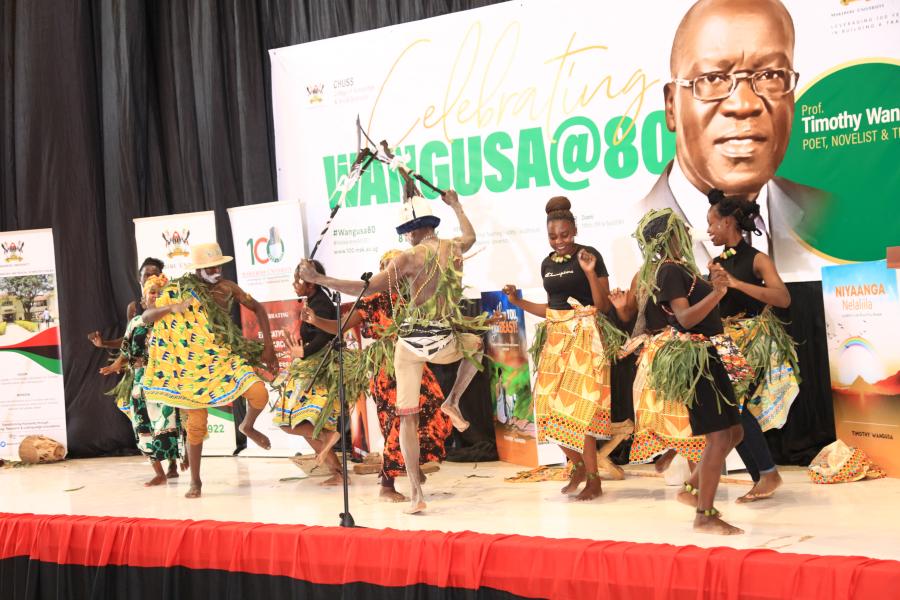
The Professor was presented with among other gifts-Mak@100 souvenirs, nine (9) books published by Makerere University Press, and poems from FEMRITE and the third year Poetry Class 2021/2022 represented by Pharis Kateregga.
This year (2022), Professor Timothy Wangusa born on 20th May 1942, celebrates 80 years. To celebrate his 80th birthday with the Makerere University family, Professor Wangusa received a cake baked by Mrs. Sheila Gowa who is 93 years old. Professor Wangusa cut the cake amidst applause from the audience and befitting birthday melodies.
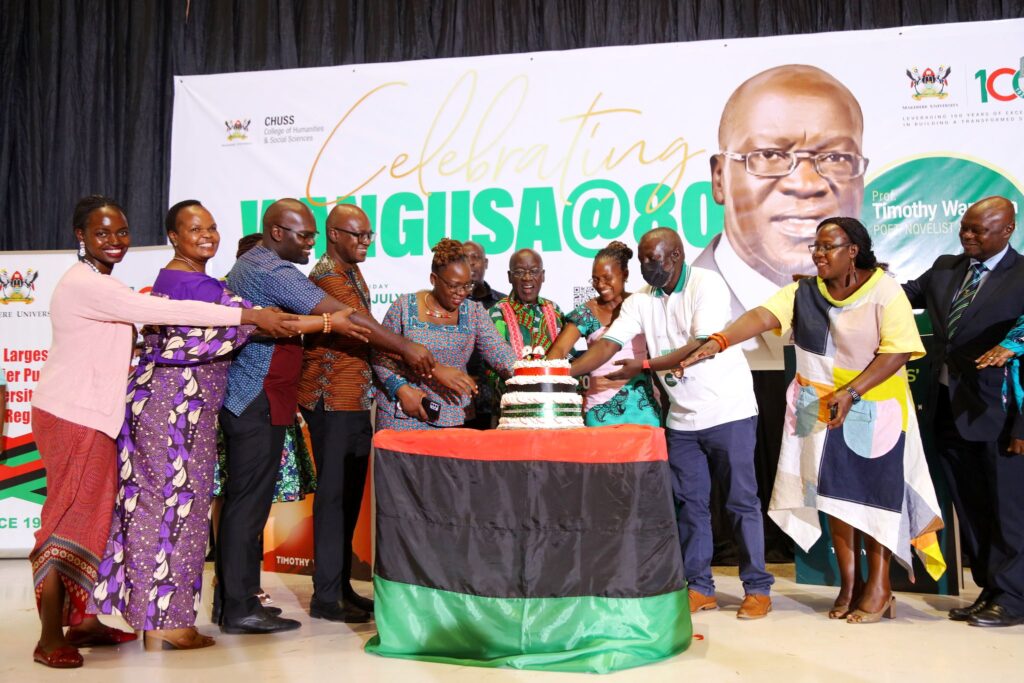
The Deputy Principal of the College of Humanities and Social Sciences, Dr. Eric Awich Ochen closed the event and lauded Wangusa for holding the torch up high for the young scholars from the College to emulate.
The event, sponsored by Fountain Publishers, Uganda Communication Commission, Femrite, Soft Power News, , Next Media, and The Edge Uganda, comes at a time when the country is polarized by the debate over the fate of letters.
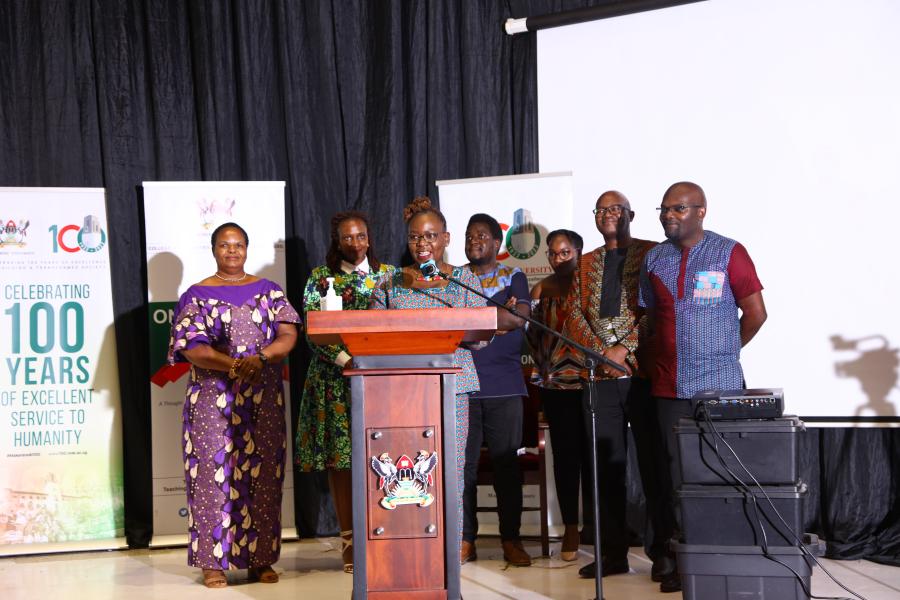
You may like
-


Makerere University commemorates 13 transformative years of partnership with Mastercard Foundation
-


Celebrating Academic Excellence: CoBAMS Presents 975 Graduands at Mak 76th Graduation Ceremony
-


Mak 76th Graduation Ceremony: CoNAS Presents 16 PhDs & Best Performing Male Student in the Sciences
-


Medical graduates urged to uphold Ethical values
-


CAES Presents Overall Best Performing Student in the Sciences & a Record 28 PhDs at the 76th Graduation Ceremony
-


Over 9,200 to graduate at Makerere University’s 76th Graduation
Humanities & Social Sciences
Meet Najjuka Whitney, The Girl Who Missed Law and Found Her Voice
Published
1 week agoon
February 23, 2026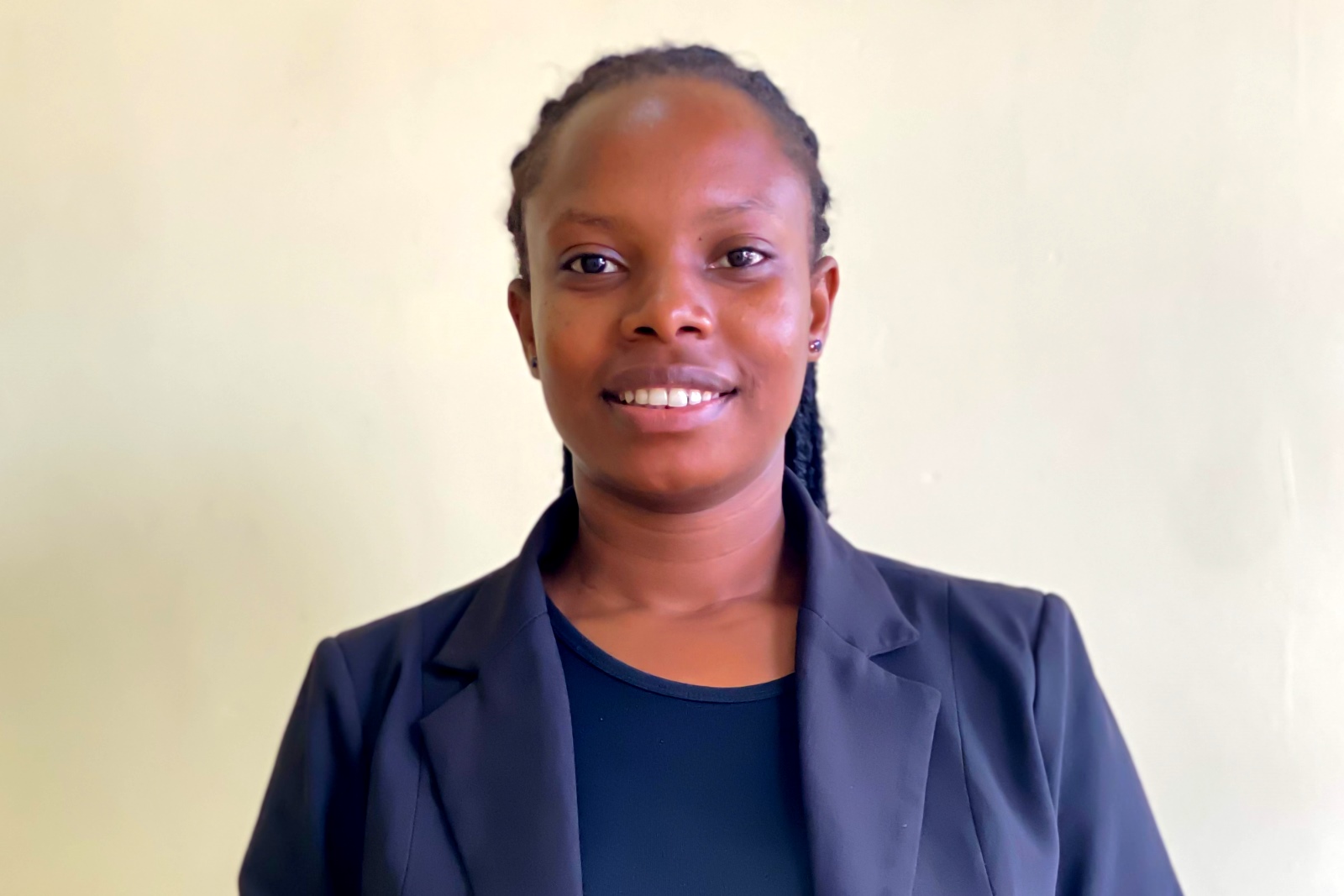
On the morning of Friday, February 27, when the academic procession winds its way across Makerere University’s Freedom Square for the last day of the 76th Graduation Ceremony, Whitney Najjuka will walk into history with a number beside her name: 4.46.
At Makerere, that number means First Class Honours. It means the Vice Chancellor’s List. It means she graduates as the only First-Class student in Journalism and Communication this year. But numbers, as Whitney has learned, rarely tell the full story.
Born on March 27, 2002, in Nabbingo, Kyengera Town Council, to Margaret Kusemererwa and Fred Kasirye, dreamt she would do Law, one of the disciplines, prestigious, almost inevitable next steps for a student who had excelled in secondary school. She had done everything correctly. Studied hard. Scored well. Followed the script.
But Makerere University had other plans. She missed the pre-entry mark, but found her name under Journalism and Communication, another prestigious course offered by the Journalism and Communication Department at Makerere University.
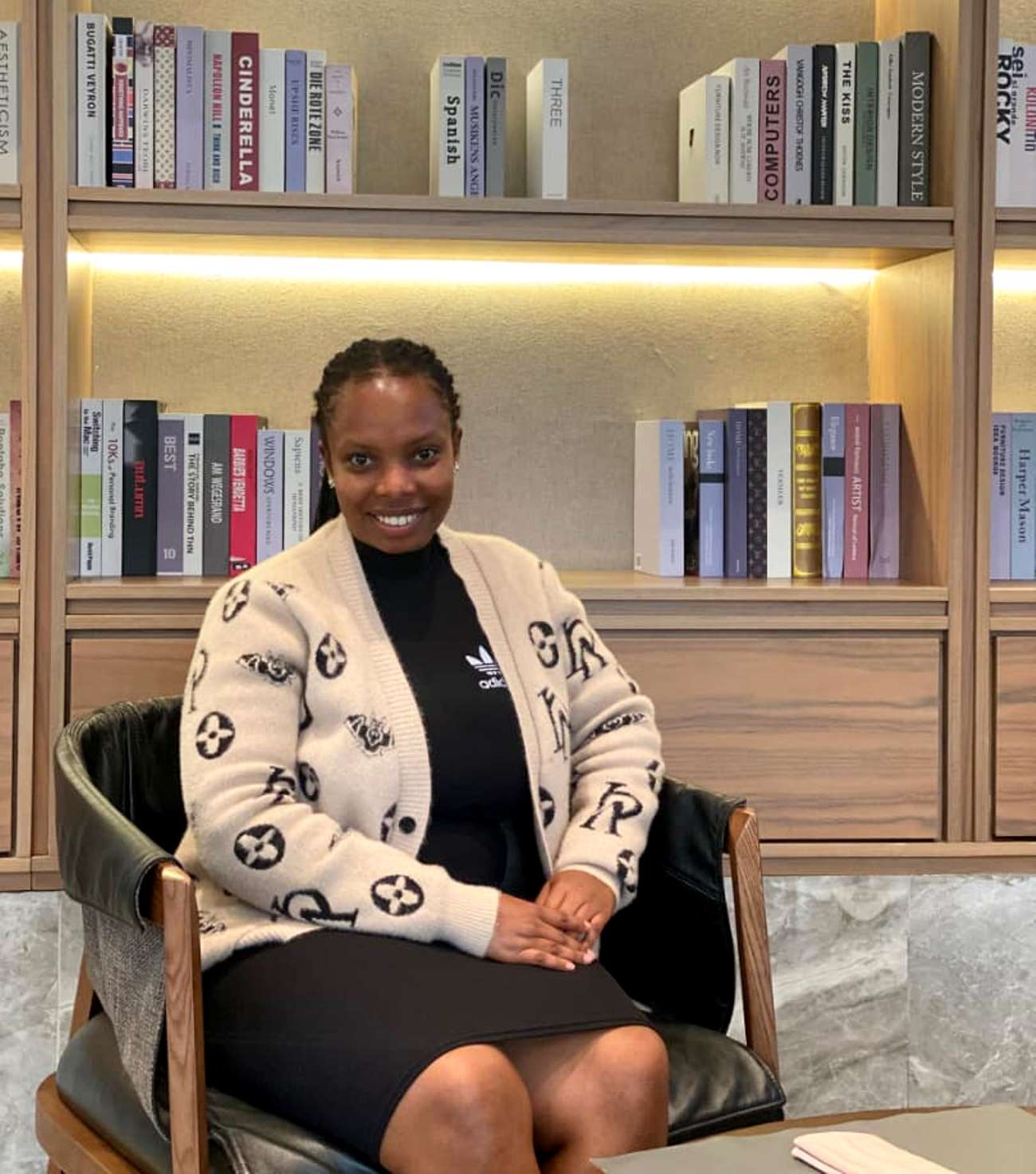
Najjuka began her academic journey at Muto Primary School in Buwama, earning 8 aggregates in the Primary Leaving Examination, a performance that positioned her strongly for secondary school.
She would later join St. Lucia Hill School, Namagoma, where she earned 20 aggregates at O-Level and 17 points in History, Luganda, and Divinity at A-Level.
Missing her dream course, Law, felt at first, like a detour. But Whitney was encouraged by Sanyu Christopher, her uncle, and she settled for a government-sponsored slot in the Bachelor of Journalism and Communication at Makerere, which she had applied for before.
She entered uncertain. But she graduates transformed.
The Pivot That Became a Purpose
Whitney speaks of her early university days with candor. She did not arrive at the Department of Journalism and Communication with a burning childhood ambition to be a journalist, but because another door had closed.
Then, Social and Behavior Change Communication happened. Applied Strategic Communication happened. She began to see media not as headlines and microphones, but as architecture, shaping how societies think, argue, and act.
The turning point came in her third year. The Female Journalist Foundation published her story on Sexual Gender-Based Violence (SGBV) and its emotional toll on survivors. What startled her was not its publication but the reaction. Comments flooded in. Debates ignited, especially about the role of men in combating GBV.
“I realized media doesn’t just report,” she says. “It frames how society views a crisis.”
Her voice, once tentative, had entered a national conversation.
The Discipline Behind 4.46
At Makerere University, a First Class CGPA is not built on brilliance alone but on ritual.
Whitney’s ritual began with showing up, on time, every time. She treated lectures as appointments with her future self. She refused to confine her learning to the syllabus. While attending workshops at the Aga Khan Graduate School of Media and Communication and obtaining external certifications, she sought and was open to mentorship through the Public Relations Association of Uganda (PRAU).
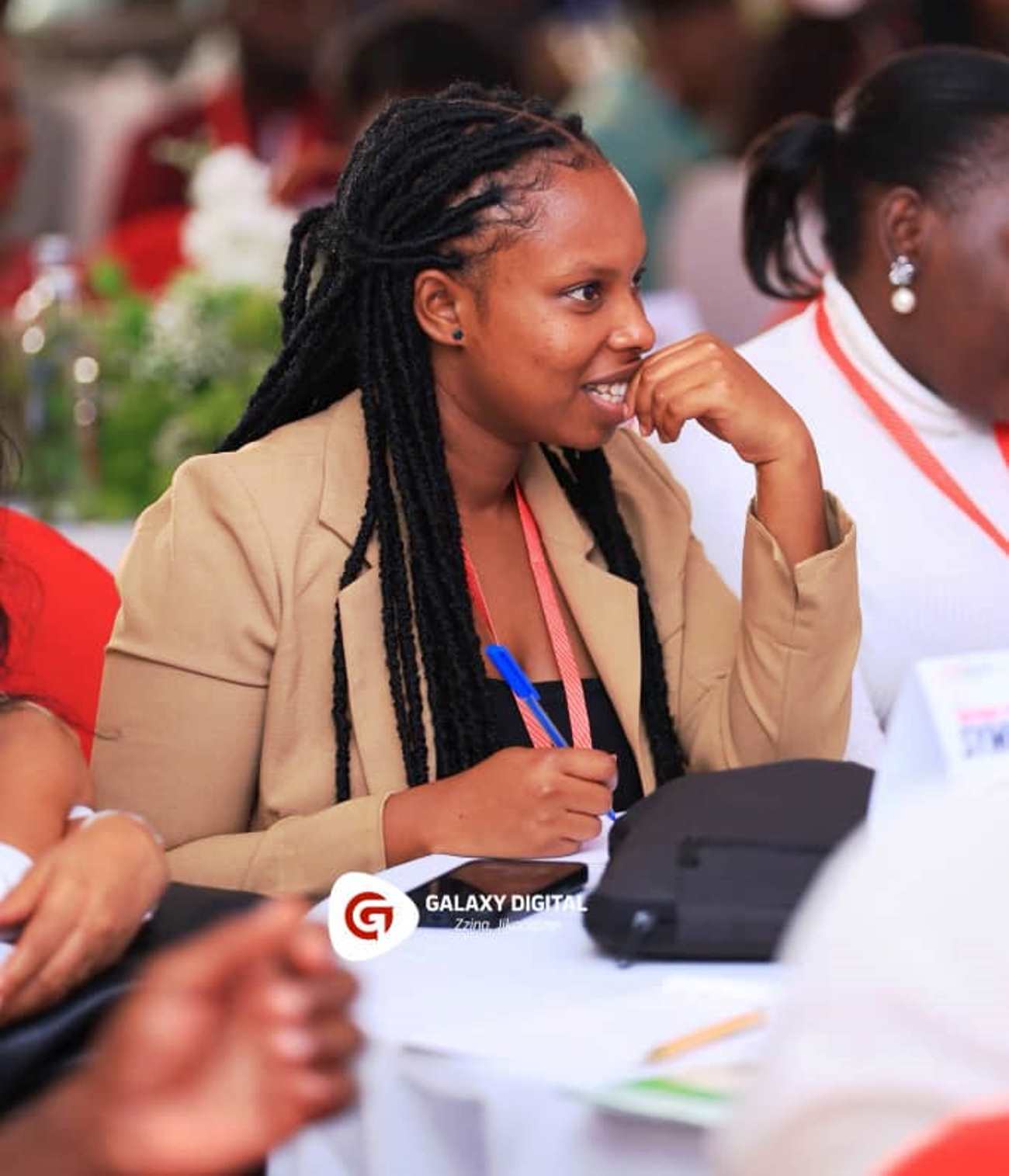
She wanted theory anchored in practice. And then there was the commute.
From Nabbingo, a hill in Wakiso District, some 18.6 km to Kampala, where the Makerere Main campus is situated, and back, nearly 20 hours a week dissolved into Kampala traffic. Two-hour journeys before 8:00 a.m. lectures. Dust. Noise. Headaches. She learned to manage energy the way others manage time. Fatigue became a tutor in resilience.
“I had to be intentional with every remaining hour,” she says. “Excuses were not an option.”
Learning to Practice Communication
If classrooms taught her analysis, presentations taught her courage. Pitching projects, defending research, and standing before peers quick to critique forced her to think on her feet. She was no longer simply studying communication; she was practicing it.
In 2024, the AGMES Fellowship at the Aga Khan Graduate School of Media and Communication pushed her further. She received funding to produce a capstone project on the mental impact of gender-based violence on survivors. She identified sources, conducted interviews, handled trauma with care, and worked with professional editors.
The Communication, she learned, is logistics and ethics as much as eloquence.
The Future She Sees
Whitney is optimistic about Uganda’s media landscape. The digital shift, she believes, has democratized influence. Young communicators are no longer confined to legacy newsrooms or offices.
Yet she sees a gap in the absence of structured research on sustainable, ethical, profitable independent media ventures in Uganda. Her ambition is not only to practice communication, but to study it. To produce data-backed frameworks that help young Ugandans transition from graduates to media entrepreneurs.
She wants to make the impact scalable.
What Remains
As the only First-Class graduate in her cohort, she is careful not to mythologize herself. “Success isn’t brilliance alone,” she says. “It’s a daily commitment when nobody is watching.”
Even before graduation, Whitney had stepped into the industry through a mentorship internship at Capital One Group (COG EA Ltd), a strategic marketing communications agency operating across East Africa.
At Capital One Group, we spoke to Paul Mwirigi Muriungi, the Managing Director and Head of Strategy, who spoke of Najjuka as a progressive and intentional young professional who approaches her work with curiosity, maturity, and responsibility.
“Her attitude is exemplary. She is teachable, receptive to feedback, and eager to grow. While technical skills can be taught, character, work ethic, and mindset determine long-term success, qualities that Whitney consistently demonstrates. Given her academic excellence and professional application, we believe she has a bright future both at Capital One Group and within the wider communications industry. She represents the kind of talent the profession needs: thoughtful, adaptable, and committed to excellence.
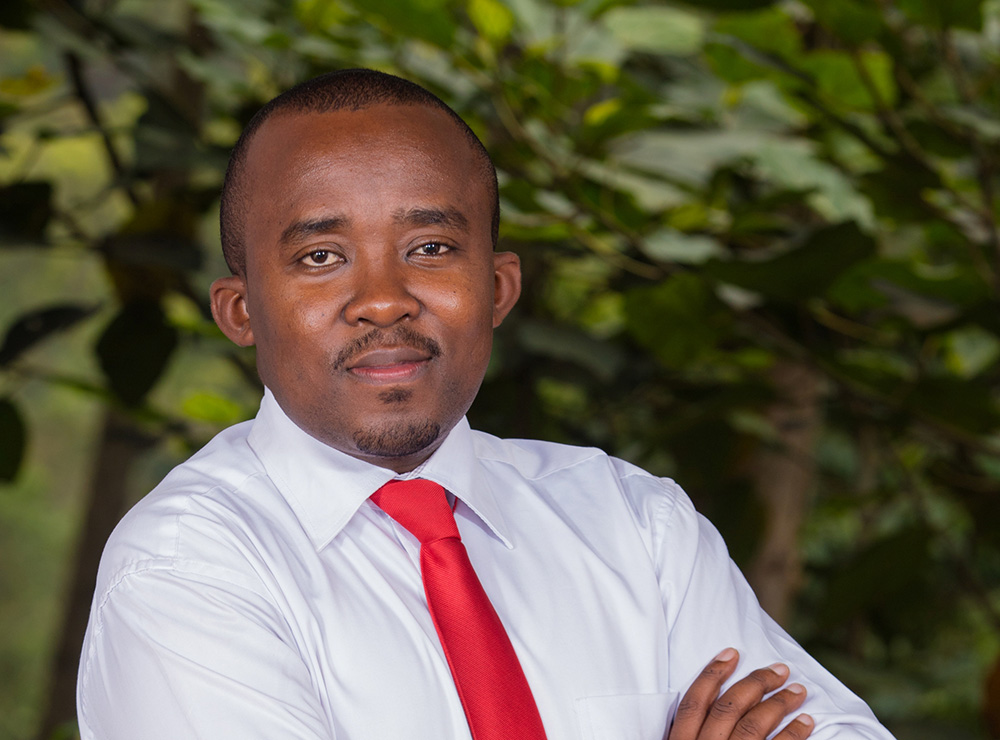
“We look forward to seeing her next chapter unfold,” says Mwirigi.
Najjuka’s gaze extends beyond her own trajectory. She speaks of what the Department could become. Furnished and equipped with industry-standard equipment, newsroom simulations, and deeper investment in data journalism as prayers. Her excellence is not self-congratulatory, but it is forward-looking.
“The University should support the Department to procure industry-standard equipment. Access to high-quality cameras, sound booths, and updated editing software like Adobe Creative Suite is critical to our learning environment,” she says.
Adding that, “We need a newsroom simulation, a physical or digital space where students work under real-time deadlines to produce content for the public. That would prepare us for industry and even strengthen the University’s own media platforms.”
In an era defined by metrics, algorithms, and digital traceability, data journalism is no longer a niche skill but a sine qua non of credible reporting. “There should also be more focus on data journalism and search engine optimization. These are no longer optional skills. Students would benefit immensely from stronger training in these areas.”
Dr. Aisha Nakiwala, the Head, Department of Journalism and Communication, says the faculty are very proud that she is graduating with a First Class—the only one in this year’s cohort.
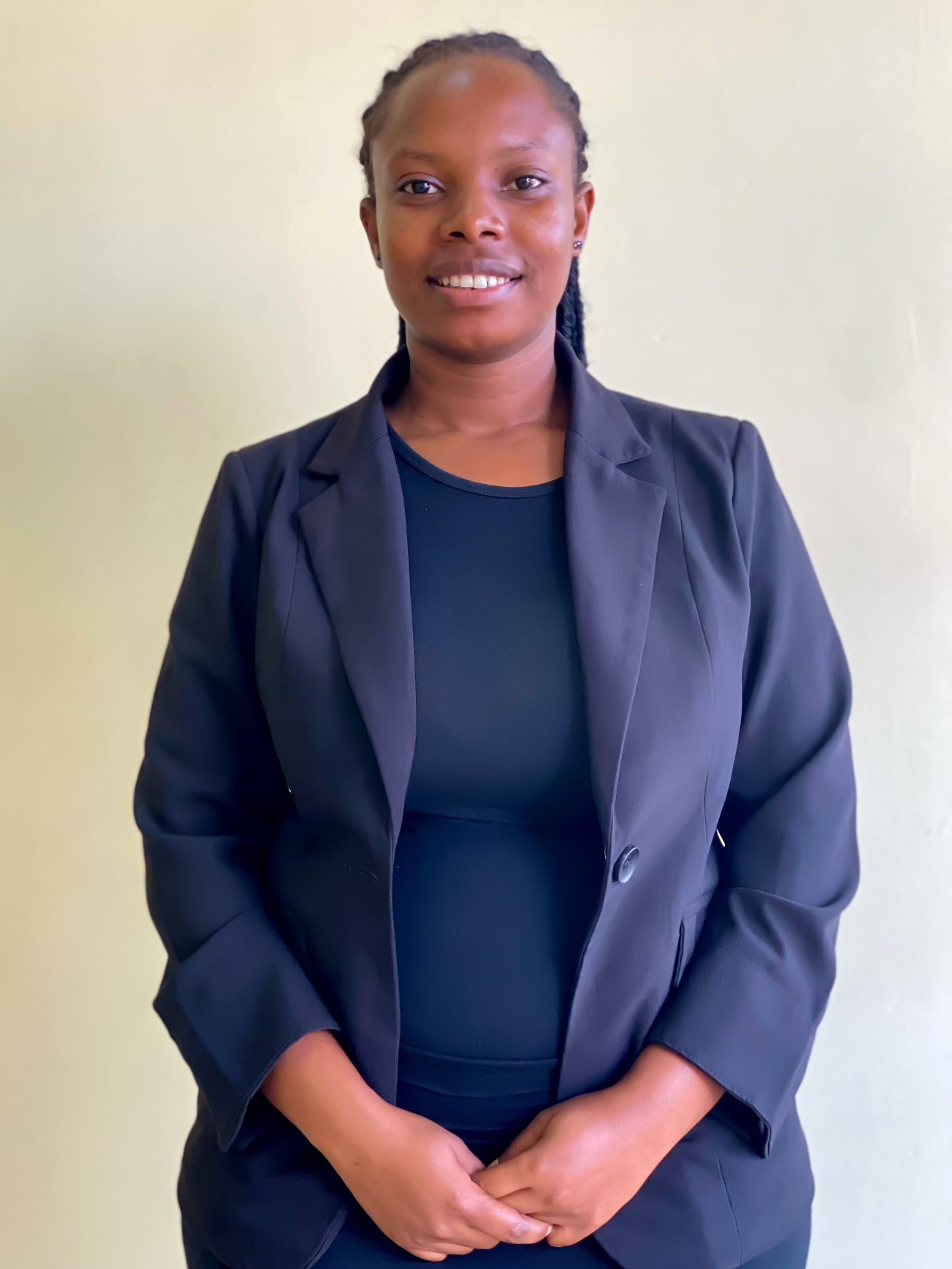
“This achievement reflects not only exceptional intellectual ability but also discipline, resilience, and sustained dedication to the highest standards over four years. Graduating with first-class honors is no small feat; it requires consistent outstanding performance.
“Her accomplishment sets a powerful example for continuing students and reaffirms our department’s commitment to nurturing excellence. We are confident she will make meaningful contributions to the communication profession and society at large,” says Dr. Nakiwala.
On graduation day, applause will crest and recede. The gowns will fold back into wardrobes. The transcripts will be filed away in cabinets. But something quieter will endure; a young woman from Nabbingo who once missed her Law mark, who spent 20 hours a week on the road, who discovered that storytelling is power, and who now walks into Freedom Square not by accident, but by intention.
Life, as she has come to understand it, lives on.
Humanities & Social Sciences
Dr. Pamela Khanakwa Honored for Steering Record 18 PhD Candidates for the Mak 2026 Graduation
Published
1 month agoon
January 23, 2026By
Jane Anyango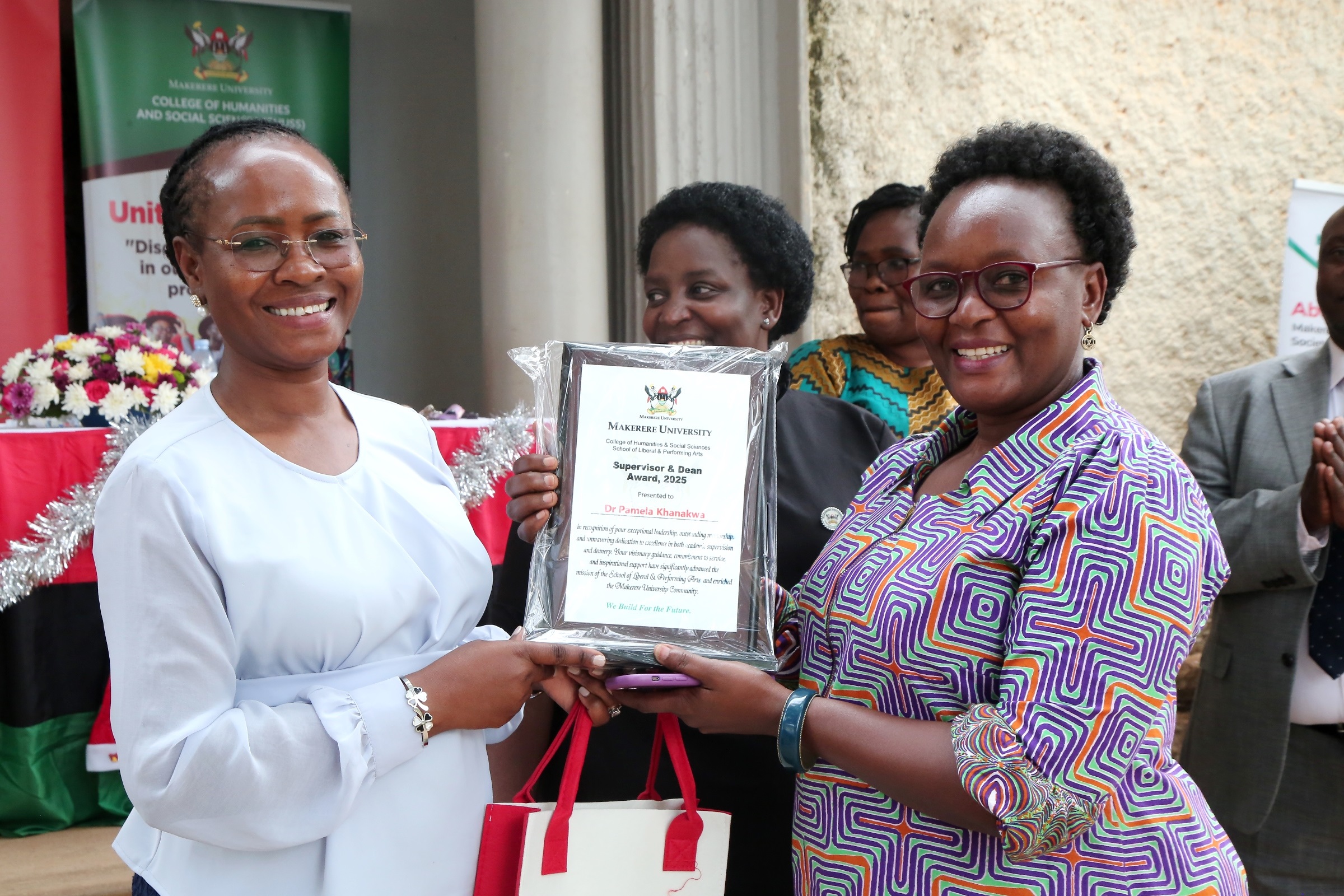
Six personally supervised, three completed in record time, as School of Liberal and Performing Arts sets a historic milestone. Dr. Pamela Khanakwa got the Award as Best PhD Supervisor and Dean
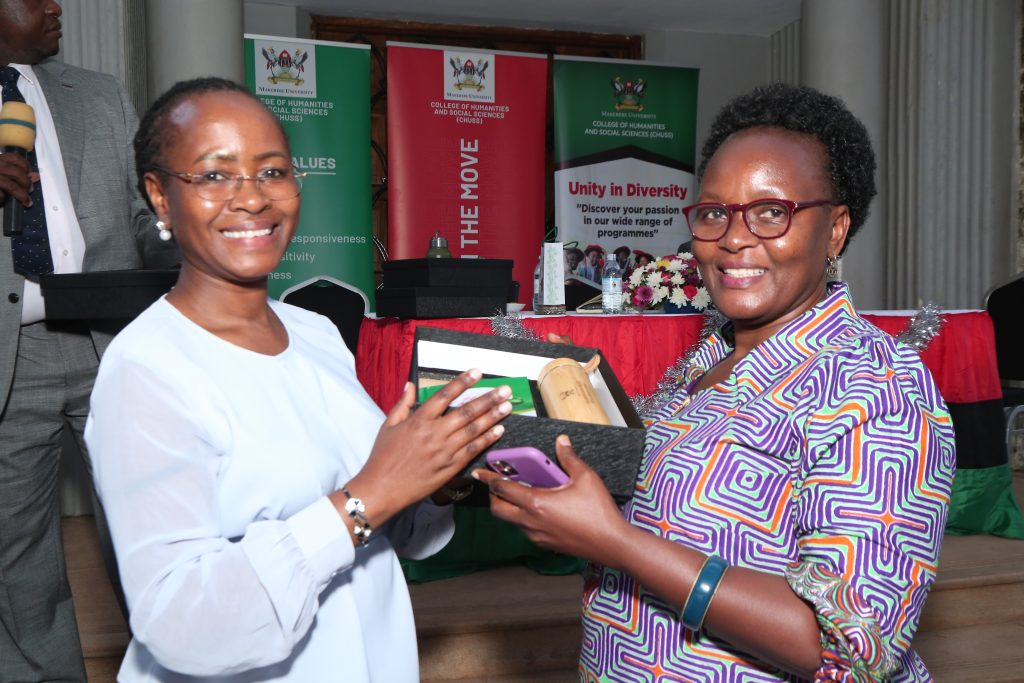
A Historic Academic Milestone for SLPA
The College of Humanities and Social Sciences (CHUSS) recognised the Dean of the School of Liberal and Performing Arts (SLPA), Dr. Pamela Khanakwa, for outstanding academic leadership that has seen the School field 18 PhD candidates for the next 2026 Makerere University Graduation Ceremony scheduled for 24th-27th February. Remarkably, six of these doctoral graduates were directly supervised by Dr. Khanakwa, with three completing within the official three-year timeframe, an exceptional achievement in graduate training. The recognition was announced during the CHUSS End-of-Year Get-Together, where staff applauded Dr. Khanakwa’s dedication, humility, and relentless commitment to postgraduate supervision and timely completion.
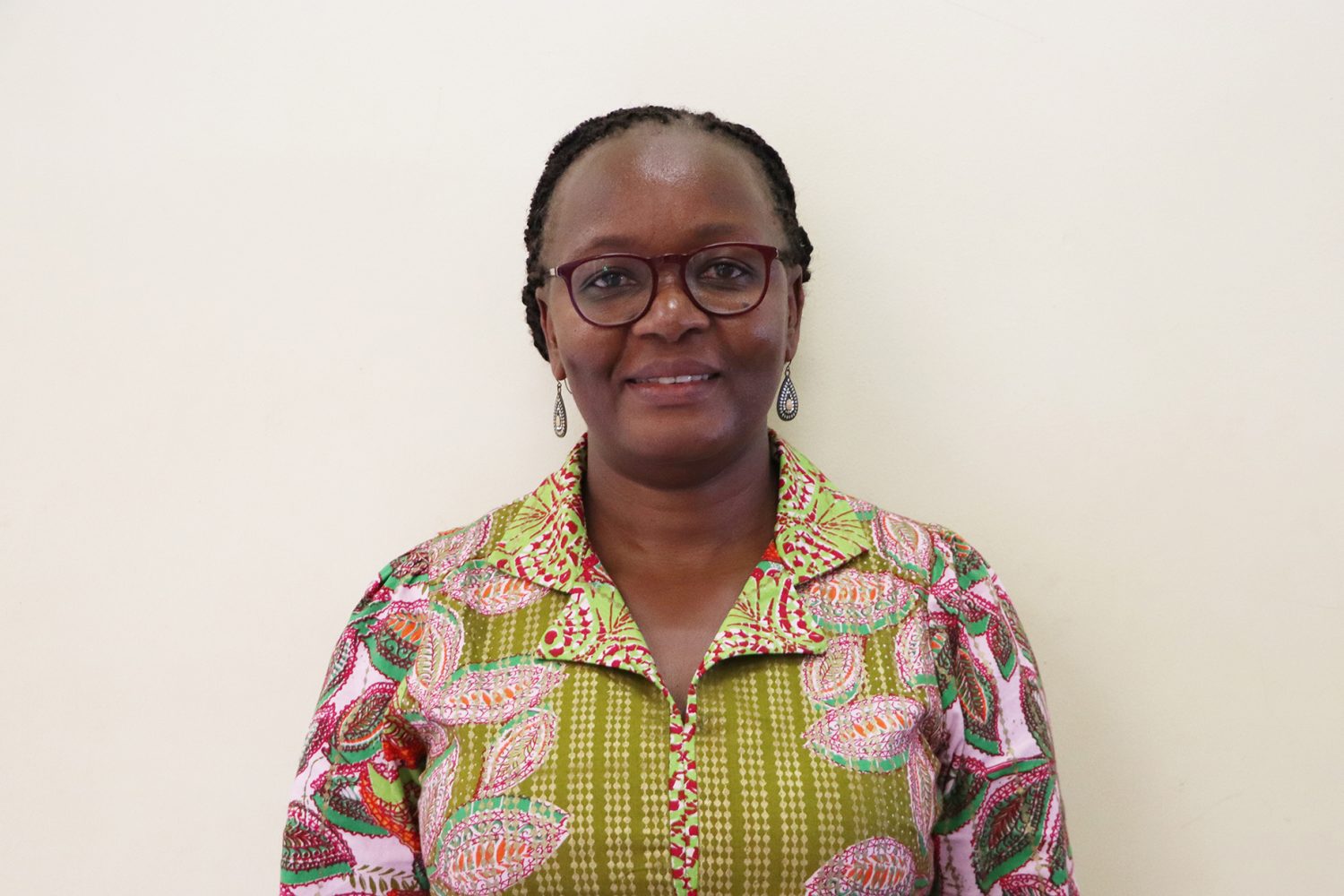
Message to Academic Staff
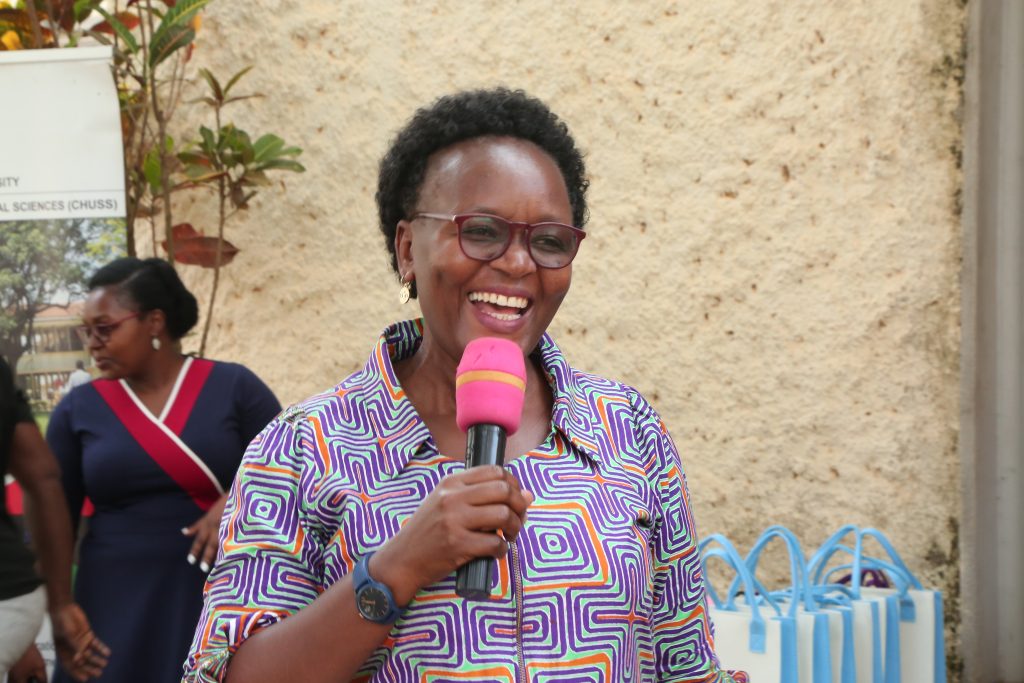
Q: What message do you have for your staff following this achievement?
Dr. Khanakwa:
First, I celebrate my staff and thank them for their dedication to supervision and student support. Academic work is demanding, and material rewards are often limited, but the true satisfaction comes from seeing students succeed.
I encourage my colleagues to remain committed. Yes, the workload is heavy, but many things are possible with dedication and teamwork. Let us continue working for the good of our students, our School, and Makerere University.
Leadership Rooted in Humility
Q: Many colleagues describe you as humble, down to earth, and hardworking. What shapes this character?
Dr. Khanakwa:
I think it is largely my upbringing. My mother was a primary school teacher from the 1950s until the mid-1980s. She worked extremely hard to raise us, combining teaching with farming to ensure we had school fees and basic needs. From her, I learned humility, discipline, and the value of hard work.
I also learned that leadership positions are temporary. You occupy them today, and tomorrow you move on. So humility is essential.
My graduate training also shaped me significantly. My PhD supervisor emphasized that graduate study is a full-time job and that results matter more than noise. Let people see your work through outcomes, not announcements.
Supervision as a Two-Way Commitment
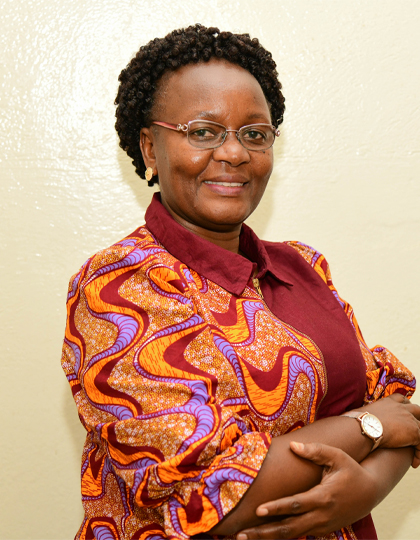
Q: How would you describe your supervision style?
Dr. Khanakwa:
I read my students’ work thoroughly, word by word. Sometimes my comments are tough, but they are honest. Supervision is a two-way commitment. I give feedback, but students must also respond and remain engaged. When that relationship works, progress happens.
Balancing Leadership, Scholarship, and Family
Q: How do you balance being a Dean, scholar, wife, mother, and daughter?
Dr. Khanakwa:
Honestly, I am not sure I balance perfectly. My mother lives far away in Bukwo, so visiting requires careful planning. My children grew up understanding the demands of academic life. I pursued my PhD in the United States and spent long periods away, but we adapted as a family.
Work has become part of my lifestyle. I use weekends to read dissertations, review manuscripts, and write. Sometimes my children ask if I ever sit without working, but this is the commitment I made. As we often say jokingly, “We humbly applied for the job, so let us do the job.”
Scholarship Beyond Supervision
Dr. Khanakwa is also an active scholar and editor. In the past year alone, she has:
- Edited scholarly volumes on archives, memory, method, and pedagogy
- Published a book with Routledge Companion
- Co-authored journal articles and book chapters with graduating students, including Priscah Asiimwe and Anatoli Lwasa Mpijja
“I feel an obligation to write with students,” she notes. “It takes time, energy, and commitment, but it is part of academic mentorship.”
Who Is Dr. Pamela Khanakwa?
Dr. Pamela Khanakwa is the Dean, School of Liberal and Performing Arts, College of Humanities and Social Sciences, Makerere University. She is a seasoned scholar, supervisor, administrator, and mentor whose leadership continues to redefine graduate training excellence. Details about Dr. Pamela Khanakwa can be accessed at: https://chuss.mak.ac.ug/en/personnel/pamela-khanakwa/
More details are available in her attached curriculum vitae.
The CHUSS End- Of-Year-Get-Together
On 12th December, 2025 the college leadership organised a get-together end of year gathering to take stock of the achievements, challenges and brainstorm together on how to move forward. The event was marked by entertainment, team building games, appreciation speeches, sharing a meal and a Christmas package for every staff
Retirees and staff recognised
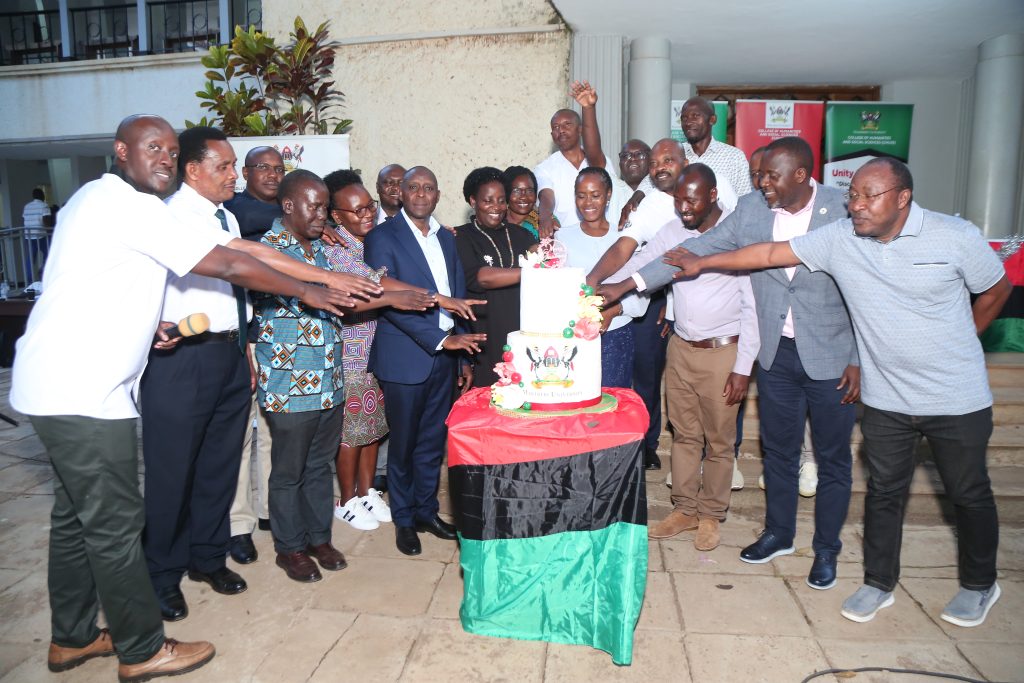
Five retired staff Dr. Micheal Wangotta Masakala, Dr. Anatole Kirigwajjo and Dr. Jackson Kizza Mukas (all from the School of Languages, Literature and Communication), Assoc. Prof. Florence Nansubuga (School of Psychology), Dr. Tusabe Gervase (School of Liberal and Perforing Arts) and Ms. Scovia Nganda Sekweyama (secretary from the School of Social Sciences) were recognised for their dedicated services to the university.
In addition to Dr. Pamela Khanakwa’s Award as Best PhD Supervisor and Dean, Ms. Birabwa Florence scooped the award of Best Registrar of the year. Birabwa is the registrar for the School of Liberal and Performing Arts.
Administrative and support staff including Ms. Mary Gyezaho and Annet Kashumbusha(both administrative secretaries in the Principals office), Farouq Lule (IT Officer), Godfrey Kakooza (cleaner), Charles Sebuguzi (driver) and Jane Anyango (Communications officer) were recognise with awards for outstanding service. Dr. Mohamed Mayanja Kajumba was from the School of Pyschology was recognised as the person with an outstanding talent in Handwriting.
The celebrations held in the Arts quadrangle were graced by the Vice Chancellor Academic Affairs Prof. Sarah Ssali and the Deputy Vice Chancellor in charge of Finance and Adminstration Prof. Ireeta Tumps.
Humanities & Social Sciences
Ugandan Journalists Trained on Peace and Gender-Sensitive Reporting Ahead of 2026 Elections
Published
2 months agoon
January 9, 2026By
Jane Anyango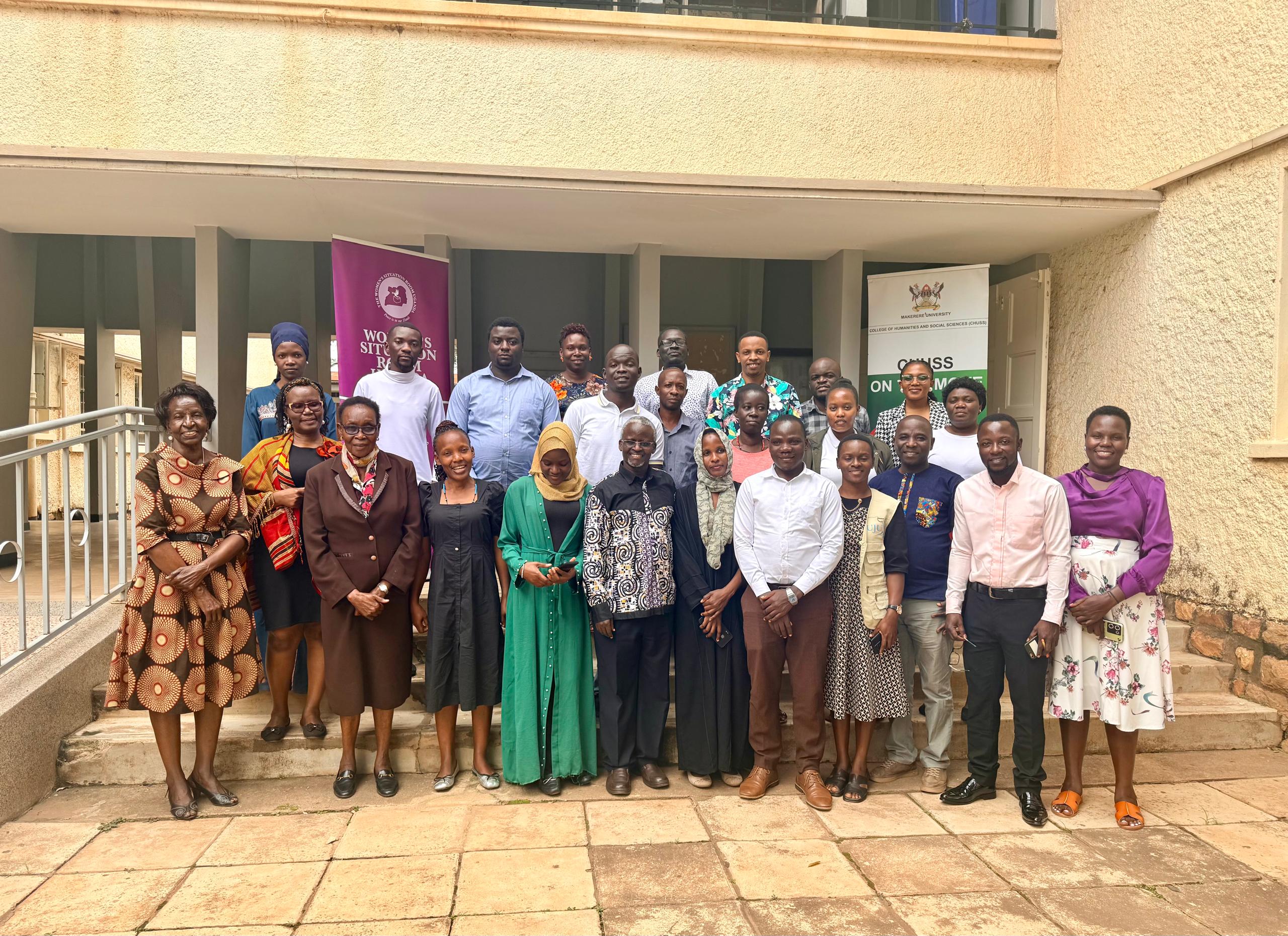
Kampala, Uganda – January 9, 2026
Ahead of the January 15 general elections, Ugandan journalists have undergone specialized training on peace and gender-sensitive reporting to ensure responsible media coverage during the election period. The two-day training, held from 8th to 9th January 2026 at Makerere University’s College of Humanities and Social Sciences Smart Room, was organized by the Women’s Situation Room (WSR) in partnership with various stakeholders and brought together journalists from across print, broadcast, and online platforms.
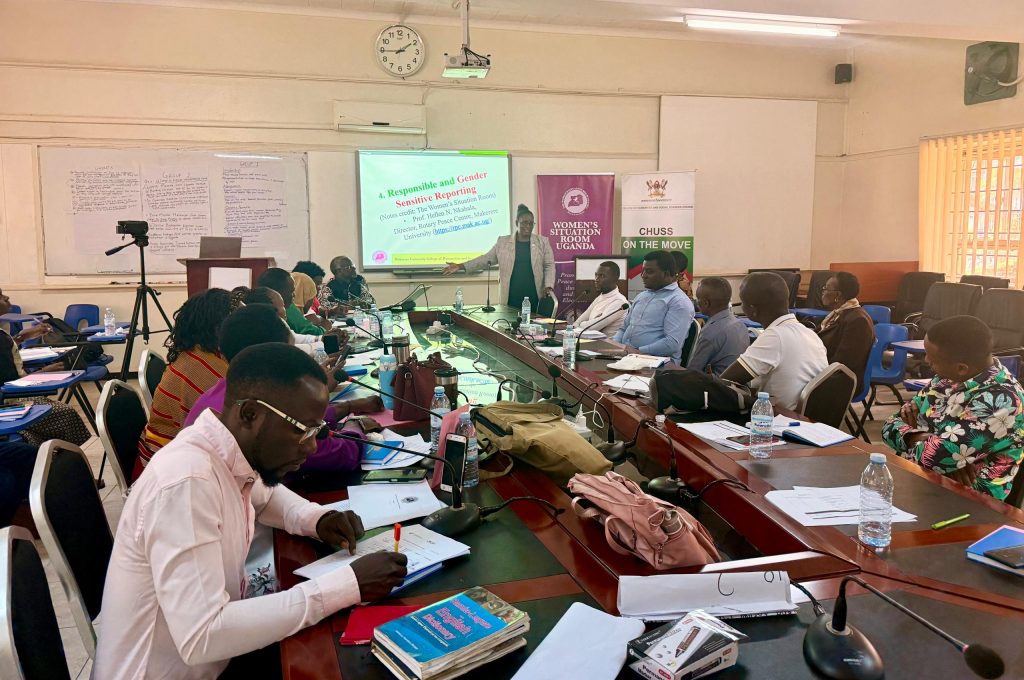
The main objective of the training was to strengthen the capacities of media in reporting and documenting electoral processes in a responsible and gender-sensitive manner. The specific objectives included: strengthening journalists’ skills to cover the 2026 elections in a fair, balanced, gender-sensitive, and non-violent partisan way; enhancing the role of media to enable citizens to be well-informed and actively participate in the election process; ensuring focused and balanced reporting on peace during and after elections; and strengthening partnerships between the WSR and media houses during the election period.
The training covered multiple critical modules. Day one focused on responsible conflict-sensitive reporting, emphasizing principles such as balance, impartiality, and accuracy. Participants explored the role of media as a relayer of the population’s voice, election monitor, catalyst for social cohesion and reconciliation, contributor to the accountability of political actors, and a platform for detecting and debunking digital media misinformation and hate speech.
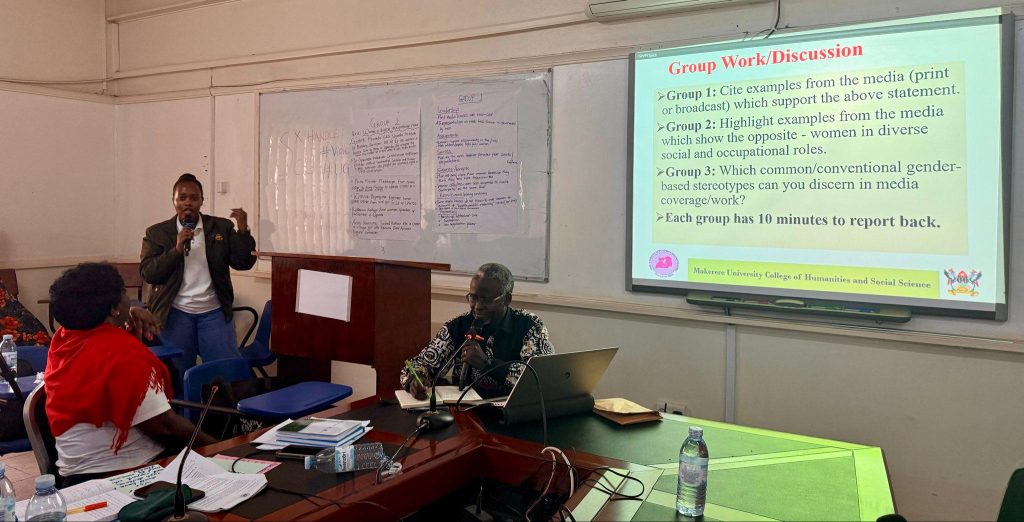
Day two addressed responsible and gender-sensitive reporting. Key aspects included the definition of gender-sensitive reporting, how to become a gender-sensitive reporter, critical elements in reporting with gender awareness, packaging gender-sensitive stories, and a checklist for detecting and avoiding gender-insensitive reporting.
Her Lordship, retired Judge Justice Mary Mayitum, emphasized the importance of peace as the foundation of development and democratic engagement. “Because we value peace more than anything. Without peace, really, you can do nothing. But where there is peace, you can have time to reflect, discuss with others, and join in meaningful dialogue,” she said. She warned that the country’s past conflicts, such as those in Gulu, underscored the necessity of maintaining national harmony.
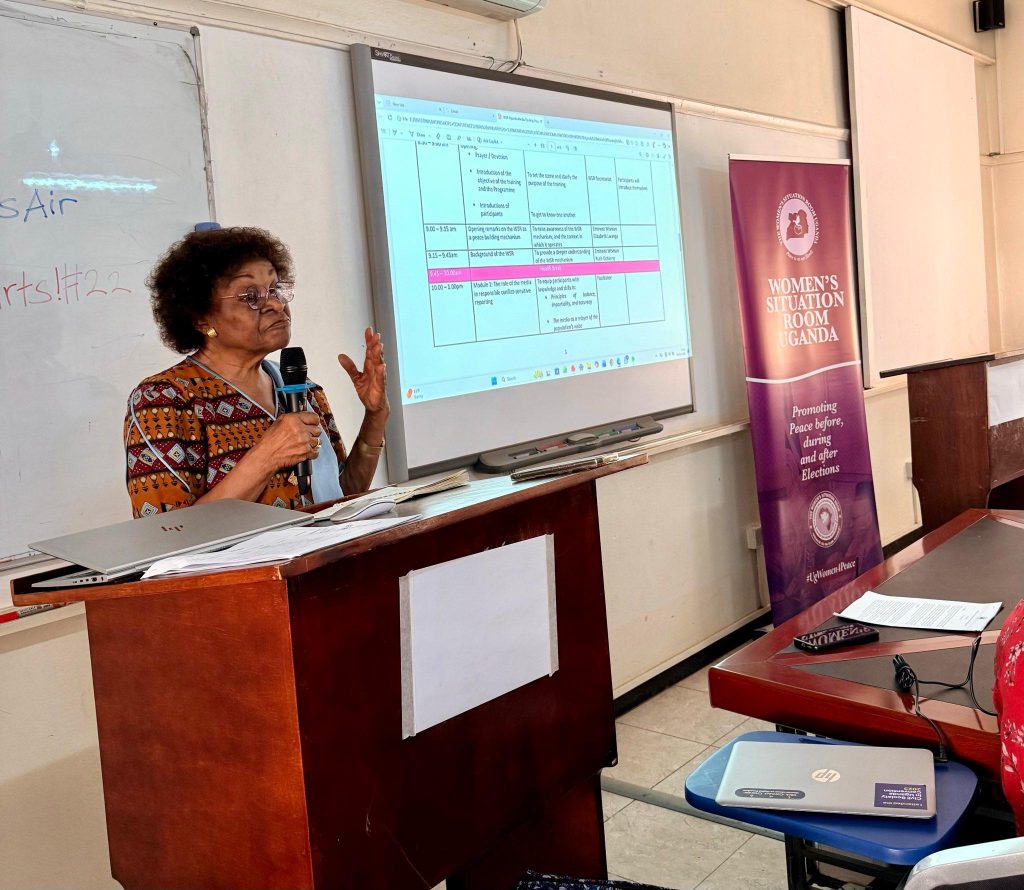
Justice Mayitum also urged other key election stakeholders to uphold peaceful conduct. “Being peaceful is the very heart of life. We have spoken to police, security personnel, political parties, and the Electoral Commission. We want politicians to have a code of conduct and to understand that it’s okay to think differently without fighting or hating one another,” she added.
Dr. William Tayebwa, lead facilitator and senior lecturer in the Department of Journalism and Communication at Makerere University, said, “This training is about conflict-sensitive reporting, peace journalism, and gender-sensitive reporting in the context of the elections. The emphasis was on giving female political candidates a voice while ensuring journalists report responsibly on election-related matters.”
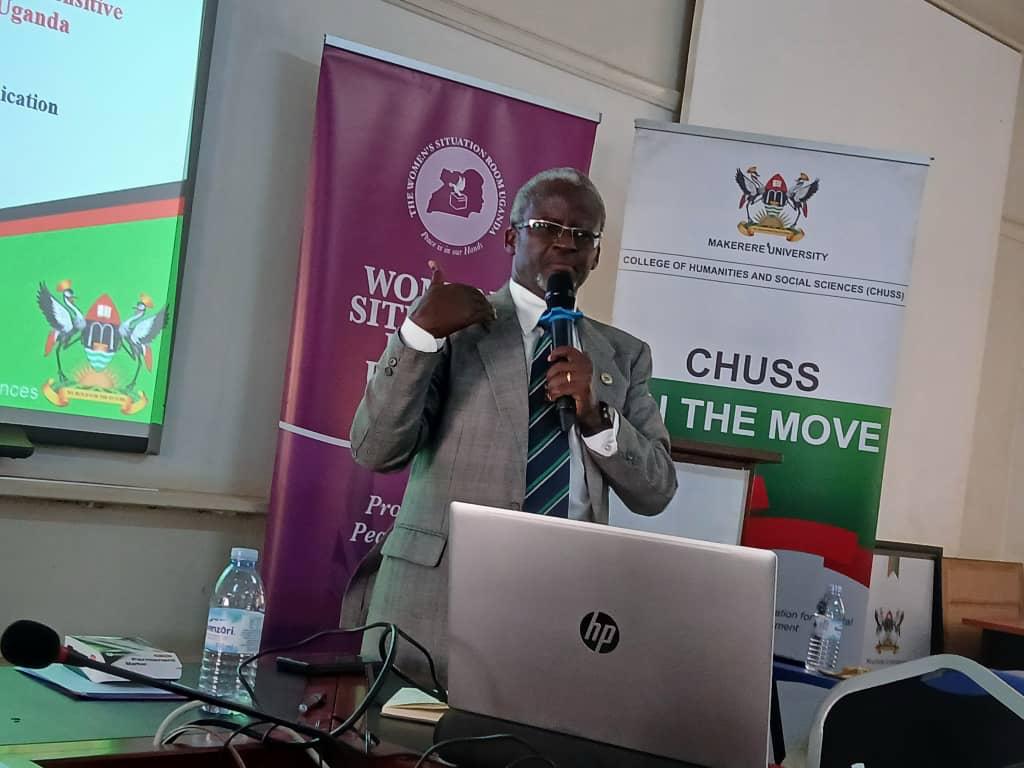
Participants described the training as timely and impactful. Tony Banizengabo of CBS Wakiso District said, “We’ve benefited a lot. We’ve been trained to write stories which bring peace, not conflict. Ahead of the elections, we are very ready to be part of peacemakers.”
Dorcas Kimono of UBC TV Kampala added, “It was so timely and rich. We learned how to report without promoting or fueling violence, giving voice to victims without angering them or encouraging violators. This is very vital, especially as we approach the 2026 elections.”
The training aims to equip media personnel with the knowledge and skills to uphold professional ethics while contributing to a peaceful, inclusive, and gender-sensitive electoral process.
Trending
-

 Humanities & Social Sciences1 week ago
Humanities & Social Sciences1 week agoMeet Najjuka Whitney, The Girl Who Missed Law and Found Her Voice
-

 General7 days ago
General7 days ago76th Graduation Highlights
-

 Health2 weeks ago
Health2 weeks agoUganda has until 2030 to end Open Defecation as Ntaro’s PhD Examines Kabale’s Progress
-

 Agriculture & Environment2 weeks ago
Agriculture & Environment2 weeks agoUganda Martyrs Namugongo Students Turn Organic Waste into Soap in an Innovative School Project on Sustainable Waste Management
-

 General2 weeks ago
General2 weeks agoMastercard Foundation Scholars embrace and honour their rich cultural diversity
